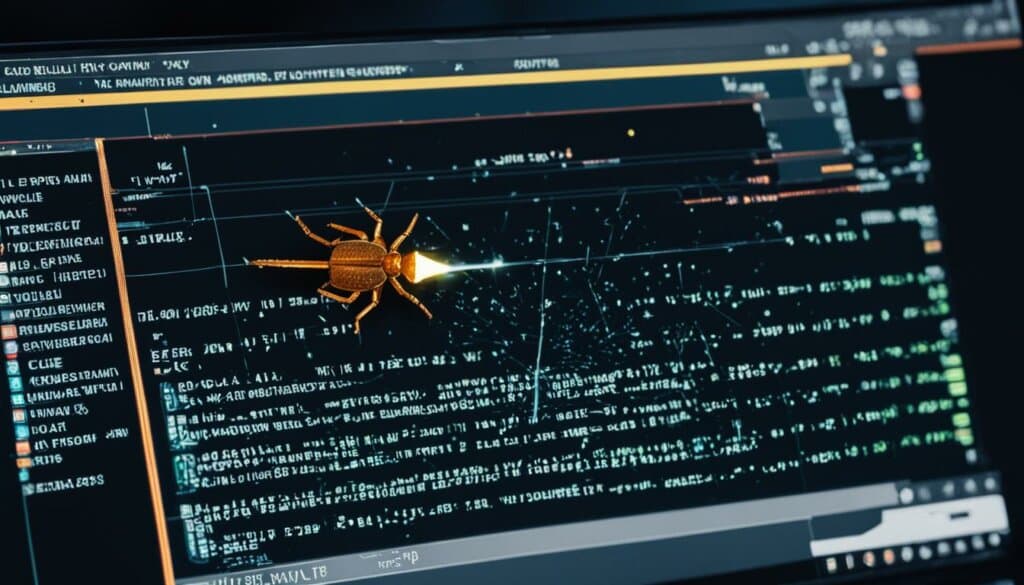Table of Contents
Introducing ChatGPT, an innovative tool powered by natural language processing (NLP) that has revolutionized bug detection and fixes in computer code. Developed by OpenAI, ChatGPT is a state-of-the-art chatbot that utilizes advanced machine learning techniques to identify and resolve bugs with remarkable precision.
In the world of software development, bugs can be a significant challenge, resulting in system crashes, errors, and inefficiencies. With ChatGPT, however, these issues become more manageable. By leveraging the power of NLP, ChatGPT translates complex programming languages into human-readable text, making it easier for software engineers to detect and fix bugs effectively.
What sets ChatGPT apart from other code-fixing systems is its ability to engage in a dynamic dialogue with users. Instead of relying solely on predefined inputs, ChatGPT adapts and learns from user interactions, enabling it to understand and address specific programming issues more accurately. In this way, it surpasses the capabilities of traditional bug-detection tools, delivering superior results and saving valuable time for developers.
With its remarkable bug detection accuracy and intuitive interface, ChatGPT has quickly gained prominence within the software development community. The potential impact of this innovative technology on the bug-fixing industry is immense, with the potential to redefine the way software engineers approach and resolve coding issues.
In the following sections, we will explore how ChatGPT detects and fixes bugs, provide examples of its effectiveness in Python code, and discuss the advantages it offers to software engineers. We will also delve into the potential industry-wide implications of ChatGPT and its significance in the realm of computer bug detection. Join us as we explore the exciting possibilities that ChatGPT brings to the coding world.
How ChatGPT Detects and Fixes Bugs
When it comes to bug detection and software fixes, ChatGPT has proven to be a formidable contender among other code-fixing systems. To assess its capabilities, researchers subjected ChatGPT, alongside four other systems, to 40 pieces of buggy code for analysis.
During the first pass, ChatGPT displayed a performance similar to the other systems. However, it was the dialogue engagement feature that set ChatGPT apart from the rest. The ability to interact with ChatGPT after receiving an initial answer proved to be its winning advantage.
With this valuable opportunity for dialogue, ChatGPT demonstrated its prowess by successfully resolving 31 out of the 40 bugs presented. This impressive feat outshone the performance of the other code-fixing systems, making ChatGPT the crown jewel in bug detection and fixes.
Furthermore, ChatGPT’s success rate was further enhanced through the provision of additional information and hints about the problem and the specific bug at hand. By equipping ChatGPT with these crucial details, the system’s problem-solving capacity soared to new heights.
Examples of ChatGPT Fixing Bugs in Python Code
ChatGPT, powered by its advanced natural language processing capabilities, excels in bug detection and fixes in Python code. Let’s explore some examples that showcase the effectiveness of ChatGPT in identifying and resolving programming errors.
1. Bug Detection in Circle Area Calculation:
Consider the following Python script for calculating the area of a circle:
radius = 5
area = 3.14 * radius**2
print("The area of the circle is:", area)
However, there’s a bug in this code. ChatGPT quickly recognizes that the formula should use the value of pi (~3.1415) instead of directly using 3.14. It suggests the following bug fix:
import math
radius = 5
area = math.pi * radius**2
print("The area of the circle is:", area)
2. Bug Fixes in Factorial Calculation:
Let’s consider a Python script that calculates the factorial of a given number:
def factorial(n):
factorial = 1
for i in range(1, n+1):
factorial = factorial * i
return factorialnumber = 5
result = factorial(number)
print("The factorial of", number, "is:", result)
Despite the logic being correct, there’s an indentation issue in the code. ChatGPT swiftly detects the bug and suggests the following fix:
def factorial(n):
factorial = 1
for i in range(1, n+1):
factorial = factorial * i
return factorialnumber = 5
result = factorial(number)
print("The factorial of", number, "is:", result)
These examples demonstrate the proficiency of ChatGPT in detecting and fixing bugs in Python code. However, ChatGPT is not limited to Python, and its bug-fixing capabilities extend to other programming languages as well. It can handle more complex scripts, making it a versatile and invaluable tool for software engineers.
| Programming Language | Bug Detection and Fixing Capabilities |
|---|---|
| Python | ✔️ |
| JavaScript | ✔️ |
| C++ | ✔️ |
| Java | ✔️ |
With ChatGPT’s exceptional bug detection and fixing capabilities, it is transforming the way software engineers approach code debugging. By saving time and effort, ChatGPT enhances productivity and efficiency in the software development process.
The Potential Impact of ChatGPT in the Bug-Fixing Industry
The success of ChatGPT in bug detection and fixes has the potential to redefine the bug-fixing industry. Popular tools used by software engineers, such as Sentry, could be greatly enhanced by incorporating ChatGPT’s capabilities. However, the current public nature of ChatGPT presents a barrier for adoption by tech companies concerned about protecting intellectual property. A paid version of ChatGPT is expected to address this issue.
The ability of ChatGPT to detect and fix bugs in computer code has already showcased its potential impact on the bug-fixing industry. Software engineers heavily rely on bug-fixing software to identify and resolve programming errors in their code. By incorporating ChatGPT into existing bug-fixing tools, software engineers can benefit from its advanced natural language processing capabilities.
ChatGPT’s potential impact extends beyond traditional bug-fixing software. It can revolutionize the way software engineers approach debugging by offering an interactive and conversational experience through its chatbot interface. This allows software engineers to provide more detailed information about the problem and the bug, leading to more accurate bug identification and resolution.
Enhancement of Existing Tools
By integrating ChatGPT’s bug detection and fixing capabilities into popular bug-fixing software like Sentry, software engineers can take advantage of its advanced AI algorithms. This integration can significantly improve the accuracy and efficiency of bug detection, ultimately reducing development time and costs.
The enhanced bug-fixing software can leverage ChatGPT’s ability to engage in a dialogue with software engineers. This interactive approach allows for a deeper understanding of the code and the bug, leading to more effective bug fixes. Software engineers can ask questions, request clarification, and provide additional information, enabling ChatGPT to provide tailored and context-aware bug-fixing solutions.
Challenges and Future Developments
Despite its potential, the public deployment of ChatGPT raises concerns for tech companies regarding intellectual property protection. The open nature of ChatGPT means that sensitive code or proprietary algorithms could be exposed. To address these concerns, a paid version of ChatGPT tailored for enterprise use is expected to be developed. This paid version would offer enhanced security measures and the ability to operate within closed network environments, making it more suitable for commercial adoption.
Looking ahead, the bug-fixing industry can expect further advancements in bug detection and fixing software facilitated by machine learning and natural language processing technologies. By continuously refining ChatGPT’s algorithms, its impact in the industry will continue to expand, benefiting software engineers in their quest for efficient bug fixing and code optimization.

The Advantages of ChatGPT in Computer Bug Detection
When it comes to bug detection in computer code, software engineers need an efficient and reliable tool that can save them time and effort. That’s where ChatGPT, powered by natural language processing (NLP) technology, excels. With its interactive approach and ability to engage in a dialogue with users, ChatGPT offers several advantages in bug detection and fixes.
Higher Success Rates with Detailed Requests
One of the key advantages of ChatGPT is its ability to have a conversation with users, allowing for more detailed requests and information about the problem and the bug. Unlike other code-fixing systems, ChatGPT doesn’t rely solely on one-pass explanations. It can ask questions, clarify doubts, and delve deeper into the code to better understand the issue at hand. This interactive approach leads to higher success rates in bug detection and fixes.
Efficient Time and Effort Savings
With ChatGPT, software engineers can rely on an AI assistant that actively assists in debugging code. By providing additional context and guidance, ChatGPT streamlines the process of identifying and resolving bugs. This not only saves time but also reduces the effort involved in manual debugging. Software engineers can focus on other critical tasks while ChatGPT takes care of the technical intricacies of bug detection.
“The ability of ChatGPT to engage in a dialogue and ask for more information sets it apart from other code-fixing systems.”
Moreover, ChatGPT’s proficiency in bug detection is not limited to specific programming languages. It can work with various languages, including Python, JavaScript, and C++, making it versatile for software engineers across different projects and environments.
By leveraging the advantages of ChatGPT, software engineers can enhance their productivity, improve code quality, and accelerate the bug-fixing process. ChatGPT is a valuable tool in the arsenal of every software engineer, offering the benefits of interactive bug detection and efficient code debugging.
With ChatGPT by their side, software engineers can confidently navigate the complexities of computer code, knowing they have the support of an AI-powered assistant that excels in bug detection and fixes.
Conclusion
ChatGPT has demonstrated its efficacy as a powerful tool in the realm of bug detection and fixing in computer code. What sets it apart from other code-fixing systems is its unique ability to engage in dialogue with users, allowing for more targeted and detailed information gathering. By leveraging machine learning and natural language processing, ChatGPT has made significant strides in revolutionizing the bug-fixing industry.
As technology continues to evolve, ChatGPT’s potential impact on the bug-fixing industry becomes increasingly apparent. Its interactive approach, paired with its exceptional bug detection capabilities, has the potential to greatly enhance the work of software engineers. With further advancements, ChatGPT could become an indispensable tool in the hands of those seeking to streamline the debugging process.
Incorporating machine learning into the workflow of bug detection and fixing has opened new doors for the industry. Software engineers now have access to a tool that not only saves time and effort but also enables more efficient debugging. With ChatGPT’s ability to ask for additional information, it can better understand the context of a bug and provide more accurate solutions, ultimately improving the overall quality of computer code.
In conclusion, ChatGPT’s integration of dialogue, machine learning, and bug detection capabilities positions it as a potent asset in the world of computer code bug fixing. As this technology continues to evolve, it promises to play a significant role in streamlining the bug-fixing process and driving advancements in the field of software engineering.
FAQ
How does ChatGPT detect and fix bugs in computer code?
ChatGPT uses its natural language processing capabilities to identify bugs in code. It analyzes the provided information and engages in a dialogue with the user to gather more details about the problem and the bug. By understanding the context and intent, ChatGPT can accurately detect and suggest fixes for the bugs.
Can ChatGPT fix bugs in any programming language?
Yes, ChatGPT is capable of working with any programming language. While it has been proven successful in detecting and fixing bugs in Python code, it can handle more complex scripts in other languages as well.
How does ChatGPT outperform other code-fixing systems in bug detection?
ChatGPT’s ability to engage in a dialogue with users and ask for more information sets it apart from other systems. By interacting with the system and providing additional hints about the problem and the bug, users can increase the success rate of bug detection and fixes.
What impact can ChatGPT have on the bug-fixing industry?
ChatGPT has the potential to revolutionize the bug-fixing industry. By incorporating its capabilities into popular tools used by software engineers, such as Sentry, the efficiency and effectiveness of bug detection and fixes can be greatly enhanced.
What are the advantages of using ChatGPT for bug detection?
One of the key advantages of ChatGPT is its ability to engage in a dialogue with users. This interactive approach allows for more detailed requests and information about the problem and the bug, leading to higher success rates in bug detection and fixes. Using ChatGPT saves software engineers time and effort in debugging their code.
How can ChatGPT be adopted by tech companies concerned about protecting intellectual property?
The current public nature of ChatGPT presents a barrier for adoption by tech companies. However, a paid version of ChatGPT is expected to address this issue, providing a more secure environment for companies to utilize its bug detection and fixing capabilities while protecting their intellectual property.













